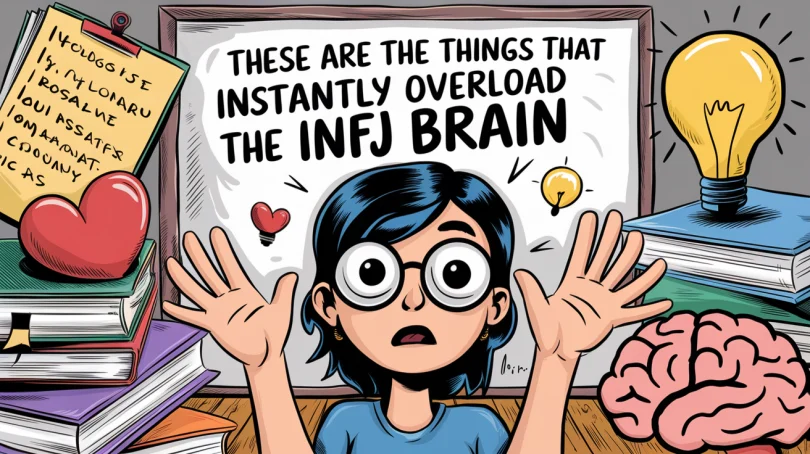The INFJ brain is a vast space of concepts, creativity, and insightful ideas. There’s no beginning and no end to their multifaceted super-brain, making it one of their greatest assets. However, with so much potential, external sensitivity, and the never-ending processing required, it sometimes gets overloaded in the process.
Number 1: Conflict with others
Empathetic by nature, the INFJ type learns from an early age just how much of a toll interpersonal conflicts have on their well-being and state of mind. Conflict-avoidant, they begin taking the necessary measures to avoid even relationship-building arguments, which sometimes have a less-than-positive effect on their connections. Despite the measures they take, sometimes conflict is unavoidable.
END INFJ LONELINESS WITH THIS ONE CHANGE
Of course, some conflicts are worse than others, and the overload depends on the severity of the squabble. When this type is having challenges with someone they love, such as in a romantic relationship or with family, their brain can become overwhelmed with not only the normal fight-or-flight reaction but also an empathetic understanding of where the other person is coming from.
This is where communicating their thoughts on the matter becomes tricky, as they can easily play devil’s advocate, even to their detriment. Unlike close-relation conflicts, unexpected arguments with acquaintances overload their brains. Being the sensitive introvert they are, INFJs have a hard time thinking on the spot, especially when they’re distracted by anxiety.
Number 2: An issue they can’t quite resolve
Speaking of conflicts, another challenge is when there’s an issue they can’t resolve. Whether personal, interpersonal, conceptual, or a problem that isn’t theirs, this problem-solving type becomes seriously overloaded when they can’t resolve an issue brought to their attention. With webs of information stored in their brain, INFJs pride themselves on their ability to analyze, diagnose, and mend issues of any sort. They’re not only able to come up with the best solution but also predict the effect it will have on everyone involved and any future consequences.
This ability comes from their cognitive makeup of introverted intuition, extroverted feeling, and introverted thinking. When they’re unable to conclude, their brain feels like it’s short-circuiting. They feel as though their brain is malfunctioning, likely distracted by something deeper than they can pinpoint.
Number 3: Concepts they can’t wrap their heads around
The mind of an INFJ is swift and witty. They don’t take long to understand even the most complex theories and concepts, allowing them to keep up in conversation, no matter the topic.
However, when this clever personality type feels lost in discussion or is introduced to a concept they can’t quite wrap their heads around, their brain becomes overloaded. Like a computer with too many tabs open, the INFJ mind begins to overheat, not only from processing information but also from self-criticism. While they may pretend to follow along, internally there’s a battle that quickly consumes their attention span.
They may sometimes give up completely and drift off into their imagination. But they won’t give up for long, as they won’t settle for a lack of understanding. Once alone, they’ll do whatever it takes to comprehend the topic and might even become an expert in it.
Number 4: Open work or learning environments
There’s nothing that quite overloads the INFJ brain like an environment that doesn’t allow them to tune into their introverted functions. With their unique combination of extroverted feeling/sensing and introverted intuition/feeling, they can become easily distracted by their surroundings.
This is helpful when observing and analyzing others, but when it comes time to concentrate on a task, they require specific external conditions to truly focus.
Open-concept offices, classrooms, and even homes can throw the INFJ into total overdrive. Despite taking steps like using headphones or sitting in less-trafficked areas, there’s no escaping this brain overload in open environments.
Number 5: Complex directions
With pen and paper, INFJs are unstoppable when taking orders and instructions. Once it’s written down, they excel at any task. However, when someone gives them complex verbal instructions with many intricacies, their brain becomes overloaded. This perfectionistic type needs to understand how and why tasks come together.
When directions are given too quickly, INFJs may become distracted by their questions before fully grasping what’s being said. Their mind goes blank, and they may need to ask for instructions to be repeated slowly or simply say, “Just text it to me.”
Number 6: Making quick decisions
INFJs are known for their indecisiveness, as they consider multiple perspectives before making decisions. When they’re forced to make quick decisions, their brain quickly overloads. Their introverted intuition drives them to seek the bigger picture, leading to overthinking. Even simple decisions, like which brand of tomato sauce to buy or what to choose off a menu, can cause their brain to feel overwhelmed.
Number 7: Doing something new with someone else shadowing
Whether it’s training for a new job or learning a new skill, INFJs can become overwhelmed when they feel someone is watching them. They prefer independence and feel pressure when being observed, which takes away their ability to focus. However, if the observer is someone they deeply trust, this feeling may not apply, but it takes a great deal of trust to reach that point.
Number 8: A tight deadline
There’s nothing more overwhelming to an INFJ than a tight deadline. With their perfectionist nature, they dislike having too much to do in too little time. Unattainable deadlines or last-minute changes can trigger panic, causing their sense of concentration to be replaced by anxiety. When overwhelmed, INFJs need a place of privacy and relief from overstimulation to process the information and make a plan.







Leave a Comment